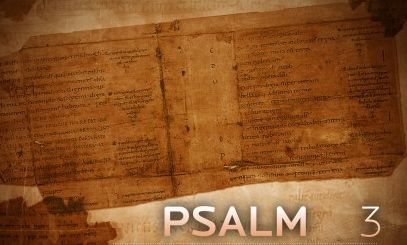Read Psalm 3 and, for some additional background, 2 Samuel 15:13-37.
and, for some additional background, 2 Samuel 15:13-37.
The title of the psalm locates its origin in a particular event in David’s life: his son Absalom has raised a coup against his father, and David and his companions flee from Jerusalem lest they be killed. David leaves weeping and barefooted, his head covered as though with shame (2 Sam 15:30). This is another incident in the terrible consequences which have befallen David in the aftermath of his adultery with Bathsheba and his consequent conspiracy to murder Uriah her husband. Perhaps God has deserted David, perhaps his blessing has departed? But – and this is critical – David refuses to allow the ark to accompany him. The ark was the symbol of God’s presence in the midst of Israel’s battle, the pledge of God fighting on behalf on his people – see the battle cry of Numbers 10:35-36. Rather, he sends the ark, Zadok the priest, and the Levites back into Jerusalem in an unreserved commitment of his life and future into God’s hands (vv. 24-29). Why would David send the ark back to the camp of his enemy? Is David deserting God?
The passage indicates that David hoped to hear news from Jerusalem, that the priests might function in some way as spies (vv. 32-36). But perhaps also, something deeper is going on here. Perhaps David is calling upon God to reaffirm and confirm his kingship in the light of Absalom’s challenge. David refuses to presume upon God or to co-opt God to his own cause. If David is Israel’s king, the Lord is King, and Israel is God’s people. David relinquishes his claim on the kingdom, and commits the welfare of the people into God’s hands, trusting that God has not abandoned him, nor annulled his call.
With this background in mind, Psalm 3 comes alive. In verses 1-2 David lifts up his worry to God: his enemies have increased, they are rising against him, they are saying that God has deserted him, that he has no help, no deliverance, no hope in God. Verses 3-6, however, express David’s confidence in God and his repudiation of their claim: he is not forsaken by God. He confesses God as his shield and glory, the One who lifts up his head, now covered in shame. David is so confident in God that he can lay down and sleep, assured of God’s protection: the Lord sustains me! Verse 7 is David’s petition, recalling the battle prayer of Numbers 10, and verse 8 brings the psalm to its conclusion with the confident affirmation that salvation, deliverance, victory and blessing belong to the Lord, and the Lord will give them to his people.
As in so many psalms, there is an evident change of tone when the psalmist shifts from complaint to trust. Craigie comments on this change which occurs at verse 3:
“The principle that is involved in this change of tone is one which is well established in the biblical literature. If one gazes too long upon the enemy and his might, the enemy grows in the mind’s eye to gigantic proportions … The hypnotic power of the enemy is broken when one turns one’s gaze toward God, who is able to fight and grant victory” (73).
There is much to glean from this short but wonderful psalm. From a historical-critical point of view, Craigie suggests that the psalm may legitimately be located in an event in David’s life, but that it then became more generally a “royal prayer for protection” in times of battle, and perhaps later became a part of Israel’s regular worship, and so was incorporated into the Psalter on this basis (Psalms 1-50, WBC, 72). By becoming a part of Israel’s regular worship, its scope and application was broadened and spiritualised: no longer was it simply a prayer for times of military engagement, but began to be used by God’s people whenever they were confronting all kinds of troubles or “enemies.”
Thus the psalm is a devotional psalm, a prayer of trust, faith and commitment. Kidner refers to it as an “evening prayer” (TOTC, 54), whereas Craigie more correctly I think, calls it a “morning prayer” (70; see verse 5 “I lay down and slept; I awoke“). The Lord has sustained us through the night and brought us safely to a new day, a day nevertheless, in which we face fresh challenges and opportunities, troubles, enemies and battles. Thus, we pray, and call on God to arise, and entrust ourselves to the One who is truly our glory and the lifter of our head, the source of all salvation, deliverance and help and blessing.
I wonder what might happen if we prayed this prayer each morning this week, committing our day and ourself to the Lord, and asking his help?